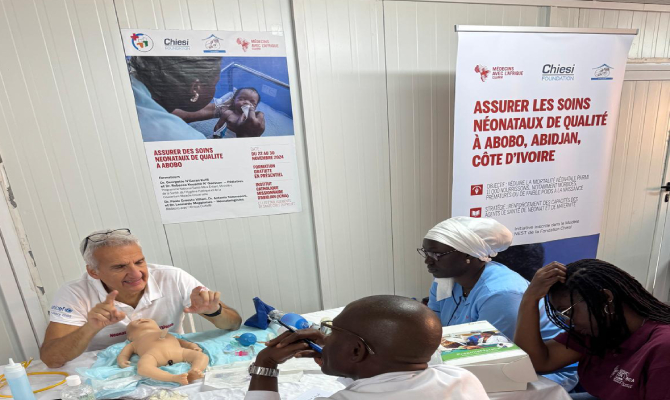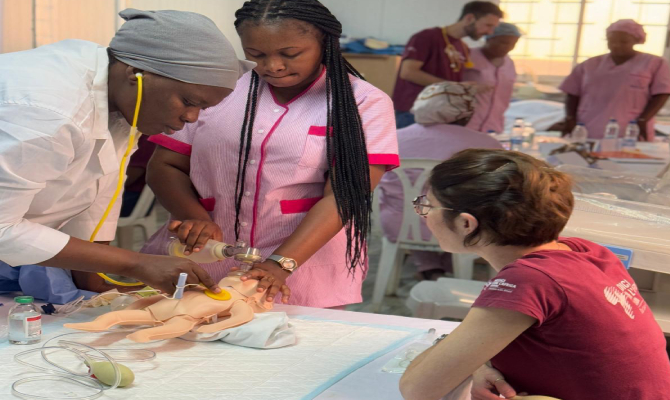A 7-days training on neonatal care was offered from November 22-30 to 40 health workers in Abidjan, Ivory Coast as part of the project “Ensuring quality neonatal care in Abobo, Abidjan” implemented by CUAMM in partnership with Chiesi Foundation.
Midwives, nurses and doctors from 3 different facilities, namely Anonkoua-Kouté (FSU-COM), Saints Cœurs de Clouetcha and Abobo regional Hospital participated in the training held by three international neonatologists from CUAMM together with two experts from the National Mother and Child Health Programme.
«We engaged professionals with different backgrounds, some of them had little experience in neonatal stabilization and resuscitation but it is important to reach a wide range of health professionals especially midwives and nurses who are the first to care for newborns» said Dr. Antonia Tomasoni.
Specific objectives of the training included:
- Update participants’ knowledge of the essential components of neonatal care;
- Ensure mastery of resuscitation maneuvers;
- Guarantee intelligent use of oxygen;
- Ensure the acquisition of newborn stabilization skills;
- Conduct on-site simulation and training sessions in a delivery room and/or neonatal ward, to make participants more comfortable in using proper equipment available.
The training, designed to foster knowledge, skills and competencies on essential functions of neonatal care among health professionals, provided both theoretical contents and cinical activities on essential care and neonatal resuscitation and stabilization techniques.
«The most interesting part of the course was that on infection management. These topics are essential for improving the quality of newborn care and allowed me to acquire practical and theoretical skills directly applicable to my daily work. I was able to better understand the concept of infection in infants and its main causes, describe the clinical signs of neonatal bacterial infections, and learn how to monitor infected infants and refer them if necessary» said Adoni Anon Marcel nurse at Saints Cœurs de Clouetcha General Hospital.

Knowing the steps of neonatal resuscitation and performing them correctly, in what is known as the golden minute, is key to save a newborn. Yet, neonatal emergencies are often received in peripheral facilities where health professionals are not properly capacitated with the skills and ability to deliver a timely and effective response.
«80 to 90% of neonatal emergencies can be managed by performing simple procedures at the early stage of the emergency without the need for further procedures such as incubation, resuscitation or even drug therapy» said Dr. Antonia Tomasoni
Unfortunately, both lack of knowledge and poor learning opportunities often jeopardize the ability of health professionals to adequately perform such life-saving procedure, with tragic consequences on maternal an dneonatal health indicators. With a population of 28.5 million and a concerning newborn mortality rate of 385 per 100,000 live births (2021), Ivory Coast faces a critical neonatal healthcare challenge.
By collaborating with Chiesi Foundation on the implementation of the Neonatal Essential Survival Technology (NEST Model), we aim to enhance care for premature, low-birth-weight, and medically fragile infants through healthcare professional training and the provision of essential equipment to neonatal wards.
«Some of the topics covered during the training were new to me, especially specific neonatal resuscitation techniques. Although I had some basic knowledge on these topics, I discovered practical tools and new methods such as MRSOPA. On the other hand, the notions on essential newborn care, such as early initiation of breastfeeding or optimal cord clamping, enabled me to reinforce practices that were already known but sometimes underestimated in my daily work» claimed Diomande Bintou, midwife at Regional Hospital of Abobo.
The initiative is being implemented by CUAMM in collaboration with the Coordination Directorate of the National Program for Maternal and Child Health (DC-PNSME) and it is aligned to the Maternal and Perinatal Death Surveillance and Response Strategy and the Mother and Child Health Strategic Plan (2021-2025) set by the government. The overall objective of the intervention is to ensure improved care for newborns therefore reduce the maternal and neonatal mortality rate in Ivory Coast.





